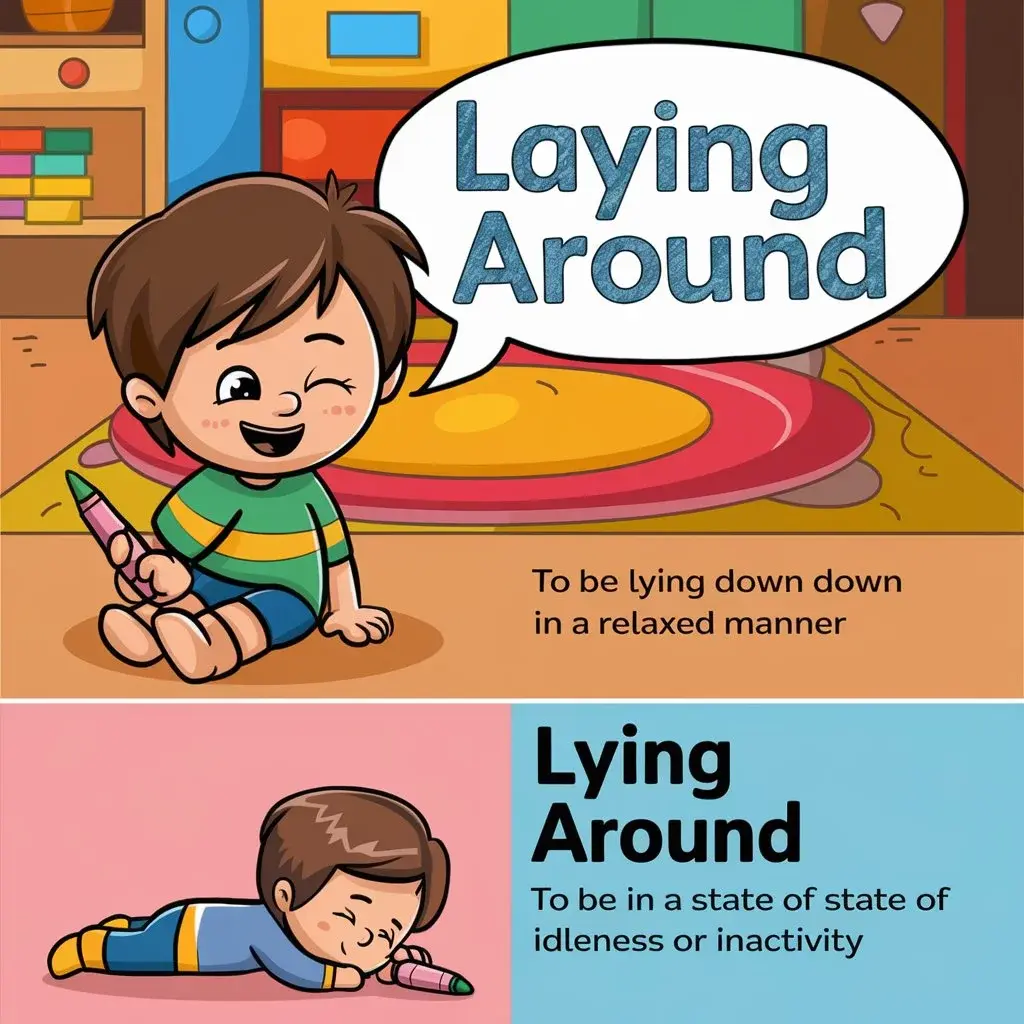Explore the differences between “Laying Around” vs. “Lying Around” in this informative guide. Understand the correct usage of these phrases, and enhance your language skills with clear explanations and examples. Perfect for anyone looking to improve their understanding of English!
“Laying around” and “lying around” sound so similar that they’re often used interchangeably in casual conversation. But while they may seem the same, there are subtle yet important distinctions between them. In everyday speech, people might not always pay attention to the difference. However, if you want to use them correctly, it’s important to know when to use each.
Today, we’re diving into the key differences between “lying around” and “laying around” so you can be more confident in your usage.
Lying Around or Laying Around: Which Is Correct?
The answer is: it depends.
- “Lying around” is used when someone or something is resting or reclining. It’s something you do to yourself. For example, “I’ve been lying around all day.”
- On the other hand, “laying around” refers to placing or leaving things somewhere. It implies that something has been left or placed in a specific position. For instance, “My books have been laying around all week.”
Examples of “Lying Around” (refers to people or animals resting or reclining):
- After work, I spent the entire evening just lying around watching TV.
- The cat was lying around on the windowsill, soaking up the sun.
- You’ve been lying around all day; it’s time to get moving!
- We found the dog lying around in the yard, looking completely relaxed.
- When we got to the beach, everyone was lying around on towels, enjoying the sun.
- He was lying around on the couch, scrolling through his phone for hours.
- I love lying around in bed on rainy mornings.
- They spent the weekend lying around, not doing much of anything.
- You’ll get bored just lying around the house all day.
- On Sundays, I usually just feel like lying around with a good book.
Examples of “Laying Around” (refers to objects left or placed somewhere):
- There were old newspapers laying around the coffee table.
- Someone left dirty dishes laying around the kitchen.
- She noticed her shoes were laying around in the hallway.
- We need to clean up the tools that are laying around in the garage.
- The kids had toys laying around the living room after playtime.
- There were pieces of paper laying around the office after the meeting.
- I found my keys laying around in the bathroom.
- It’s dangerous to leave sharp objects laying around in the house.
- Why are all your clothes laying around on the floor?
- Books were laying around everywhere in the study room.
In short, we lie ourselves down, but we lay other things down.
Lay vs. Lie: Breaking It Down
To fully understand the difference between “lying around” and “laying around,” we need to first explore the basics of the verbs “lay” and “lie.” Both relate to the idea of placing something down, but they follow different rules.
Imagine a chicken as an example:
- When the chicken lays her eggs, she first has to lie down. Once she’s comfortable, she can lay her eggs.
Notice how the chicken herself lies down, but she lays her eggs? This shows how lie applies to the subject (the chicken), while lay applies to the object (the eggs).
Examples Using “Lie” (meaning to recline or rest yourself):
- Every afternoon, I lie down for a quick nap.
- He lies on the couch after dinner to relax.
- You should lie on the floor if your back hurts.
- The dog lies by the fireplace on cold nights.
- I’m going to lie on the bed for a while to rest my eyes.
Past Tense of “Lie” (Lay):
- Yesterday, she lay in the hammock for hours enjoying the breeze.
- He lay on the grass, staring at the clouds.
- After a long day, we lay on the beach until sunset.
- I lay on the sofa last night after work and fell asleep.
Past Participle of “Lie” (Lain):
- The books have lain on that shelf untouched for years.
- By the time I arrived, the cat had lain on the porch all morning.
- He has lain in bed for two days with the flu.
- They had lain on the lawn for hours before the rain started.
Examples Using “Lay” (meaning to place something down):
- Please lay the keys on the table when you’re done.
- I’ll lay the baby in the crib gently so she doesn’t wake up.
- He lays the book on the desk before leaving the room.
- The workers lay the bricks carefully to ensure the wall is straight.
Past Tense of “Lay” (Laid):
- She laid the dishes on the table before the guests arrived.
- Yesterday, we laid the picnic blanket on the grass.
- I laid my jacket on the chair and went to grab a drink.
Past Participle of “Lay” (Laid):
- They have laid new tiles in the bathroom.
- The chef had laid out all the ingredients before starting to cook.
- The workers had laid the foundation for the building last week.
These examples show how “lie” involves reclining or resting yourself, while “lay” involves placing something down. In the past tense, “lie” becomes “lay”, and “lay” becomes “laid.” The past participle forms are “lain” for lie and “laid” for lay.
In the present tense, we use lie down when referring to ourselves and lay down when referring to other things.
Combined In A Sentence
The Past Tense: “Lay” and “Laid”
Now let’s get into the past tense, where things get a bit more complex.
- The past tense of “lie” is “lay.” If you’re talking about something you did yesterday or earlier, you would say “He lay down on the couch yesterday.”
- The past tense of “lay” is “laid.” So if you placed something down in the past, you would say “She laid the book on the table yesterday.”
The Past Participle: “Lain” and “Laid”
We also have what’s called the past participle, which acts like a special form of the verb for things that happened in the past, often used with “has” or “had.”
- The past participle of lie is lain. For example, “He had lain on the bed for hours before finally getting up.”
- The past participle of lay is laid, which remains the same as the past tense. For example, “She had laid the plates out before dinner was served.”
In both cases, “laid” stays consistent whether you’re using it in the past tense or the past participle, making things a little easier when referring to objects.
Does It Really Matter?
With all of these grammar rules in play, you might be wondering: Does it really matter if I mix them up?
In everyday conversation, the answer is often no. People will still understand what you mean even if you accidentally use “laying around” instead of “lying around,” or vice versa. The purpose of language is to communicate, and as long as the message gets across, most people won’t be nitpicky.
However, if you’re writing formally or striving for grammatical accuracy, then getting it right does matter. Knowing when to use lie and lay properly will help improve your command of the English language.
Examples of “Lying Around” in Sentences
Here are some examples where “lying around” is used correctly:
- “You need to stop lying around and find something productive to do!”
- “There’s nothing wrong with lying around once in a while when you’ve worked hard all week.”
- “I walked in, and he was just lying around on the couch, doing nothing.”
- “Lying around all day won’t solve your problems.”
- “My dog has been lying around since morning, waiting for me to come home.”
- “When you’re feeling tired, sometimes it’s nice to just spend the day lying around.”
Examples of “Laying Around” in Sentences
Now, let’s see examples of “laying around”:
- “If you keep leaving your dirty clothes laying around, they’ll attract pests!”
- “There were candy wrappers laying around the park, and it really spoiled the atmosphere.”
- “Please stop leaving your phone laying around; someone might step on it.”
- “I found my keys laying around the living room. You need to be more organized.”
- “Batman left the Batmobile laying around in Gotham, and the Joker took advantage of that mistake.”
FAQs
What’s the basic difference between “lay” and “lie”?
- Answer: The word “lay” means to place something down, and it requires a direct object (e.g., “She lays the book on the table”). “Lie” means to recline or rest, and it does not take a direct object (e.g., “He lies on the couch”).
What’s the past tense of “lie”?
- Answer: The past tense of “lie” (to recline) is “lay”. For example: “Yesterday, I lay on the beach.”
What’s the past tense of “lay”?
- Answer: The past tense of “lay” (to place something) is “laid”. For example: “She laid the keys on the counter this morning.”
How can I remember when to use “lay” or “lie”?
- Answer: A simple trick is to remember that “lay” always involves placing something else down (it needs a direct object), while “lie” is something you do to yourself.
What is the past participle of “lie”?
- Answer: The past participle of “lie” is “lain”. For example: “The books have lain on the shelf for months.”
What is the past participle of “lay”?
- Answer: The past participle of “lay” is “laid”. For example: “They have laid the carpet in the new room.”
Can “lay” and “lie” be used interchangeably?
- Answer: No, they cannot. “Lay” requires an object to act upon (e.g., “I lay the blanket on the bed”), while “lie” does not (e.g., “I lie on the bed”).
Why do people confuse “lay” and “lie” so often?
- Answer: People often confuse them because the past tense of “lie” is “lay,” which sounds identical to the present tense of “lay.” This overlap in sound makes it easy to mix up the two verbs.
Conclusion
At the end of the day, whether you should use “lying around” or “laying around” depends on what or who you’re talking about.
- If you’re talking about a person resting or reclining, they are lying around.
- If you’re referring to an object that’s been placed or left somewhere, it’s been laying around.
Though these differences are small and often unnoticed, understanding them will help you become more confident in your use of English. It’s a simple way to sharpen your language skills and communicate more clearly.

I’m Mira Sinclair, the expert helping you navigate grammar sections at “Grammer Grove.” Playing with words and expressions is my thing. At Grammer Grove, we’re here to make yourwriting stand out and shine. Let’s make your appreciation heartfelt and memorable—come and join the fun at Grammer Grove!












